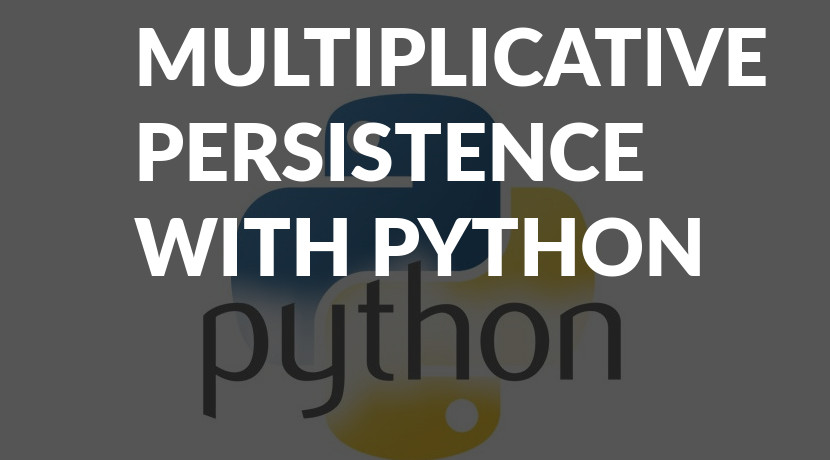I love python, there are many ways to solve problems, I specially like when seeing short-code or reduced solutions using advanced functions of the language but because I’m learning to code, I prefeer solving problems by dividing them into smaller parts, this is the longest way but the easier and educational one.
In this post I’m showing you multiple ways we can use to solve the same problem in python, in this case a multiplicative persistence problem.
Multiply all the numbers in an integer number
Supose we have the number ‘1234’ as an integer like this:
#/usr/bin/python #miguel.ortiz myNumber=1234
And we want to multiply each number of this integer like this: 1x2x3x4, we could go this way:
#/usr/bin/python
#miguel.ortiz
# our integer
myNumber=1234
# the variable for the loop start
product=1
# to iterate over the integer we must convert it to a string, integers aren't iterable.
for i in str(myNumber) :
#because "i" is a string, we must convert it to a number with int()
product *= int(i)
#print the result
print product
And this is the output:
mortiz@alberta:~/Documents/projects/python$ python multiplicative_persistence.py 1 2 6 24
Multiply all the numbers in a python list
Now imagine we don’t have an integer, but a list of numbers and we want to multiply them all, that it’s quite similar to the previous snippet but simpler:
#/usr/bin/python
#miguel.ortiz
# our integer
myNumber=[1,2,3,4]
# the variable for the loop start
product= 1
# we do not need to convert anything, you can iterate over lists
for i in myNumber :
#we do not need to convert anything, "i" it's an integer
product *= i
#print the result
print product
And of course our output is correct again:
mortiz@alberta:~/Documents/projects/python$ python multiplicative_persistence.py 1 2 6 24
The multiplicative persistent problem
Now let’s deal with the real thing. In this case we want the number of times we must multiply each number of an integer until we get one digit integer, the so called persistence:
- persistence(39) => 3 # Because 3*9 = 27, 2*7 = 14, 1*4=4 # and 4 has only one digit.
- persistence(999) => 4 # Because 9*9*9 = 729, 7*2*9 = 126, # 1*2*6 = 12, and finally 1*2 = 2.
- persistence(4) => 0 # Because 4 is already a one-digit number.
The solution for this problem would be:
- If the integer has only one digit then the result is 0
- If the integer has more than one digit then:
- Split the numbers of the integer, then multiply
- Take the result, if it has more than one digit, multiply again
- Repeat previous step until reach one digit
- When reach one digit stop and tell how many times we repeated the process
As I’ve said before, dividing the problem in small parts make it easy to solve it:
- First we create a function to process an integer, split it, then multiply it’s digits one at a time, that is the «multip» function which is exactly as the first script under (multiply all numbers in an integer number)
- After that, we create a conditional or «control structure» to evaluate if the processed number has more than 1 digit, if that’s true then a loop will iterate over and over until one digit is reached.
- Finally, when the processed integer is one digit the loop stops and print the number of times (counter) that was executed.
#!/usr/bin/python
#miguel.ortiz
digit=999
counter=1
product=1
for i in digit :
product *= i
print product
def multip(numbers) :
product= 1
for i in str(numbers) :
product *= int(i)
return product
if len(str(digit)) > 1 :
while True :
product=multip(digit)
if len(str(product)) > 1:
counter += 1
digit = product
else :
return counter
else :
return 0
That’s too much for a simple task, let’s take a look of a smaller version of this script. This one is just one function and process everything inside the same loop.
#/usr/bin/python
# anonymus
n=999
def persistence(n):
if str(n) == 1:
return 0
count = 0
while len(str(n)) > 1:
total = 1
for i in str(n):
total *= int(i)
n = total
count += 1
return count
persistence(n)
Now the smallest solutions with advanced python functions.
Using Reduce + mul
#/usr/bin/python
#anonymus
from operator import mul
n=999
def persistence(n, res=0):
return persistence(reduce(mul, map(int, str(n))), res+1) if n > 9 else
persistence(n)
Using Reduce + Lambda
#/usr/bin/python
#anonymus
n=999
def persistence(n):
nums = [int(x) for x in str(n)]
sist = 0
while len(nums) > 1:
newNum = reduce(lambda x, y: x * y, nums)
nums = [int(x) for x in str(newNum)]
sist = sist + 1
return sist
persistence(n)
Using reduce + mul in one line solution
#/usrb/bin/python
#anonymus
n=999
from operator import mul
def persistence(n):
return 0 if n<10 else persistence(reduce(mul,[int(i) for i in str(n)],1))+1
persistence(n)
All of this clearly shows how a problem may be approached in different ways, the most important is not only how to use an specific function of the language but uderstanding problems or finding a way to solve them, if we can do that, then we can start thinking about optimizing performance on a particular snippet of code.

